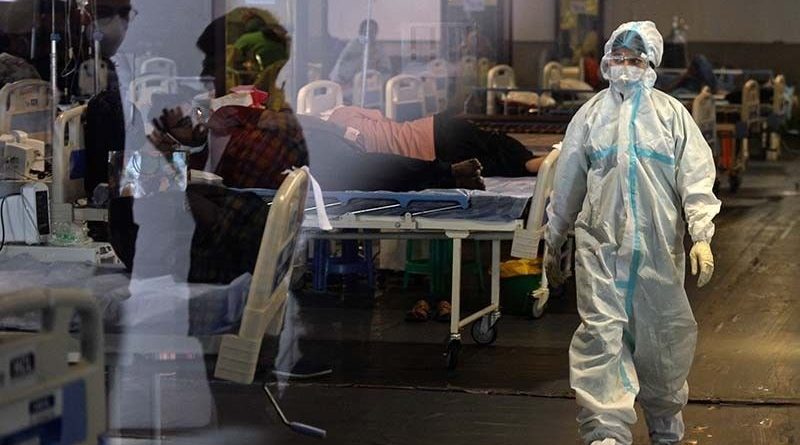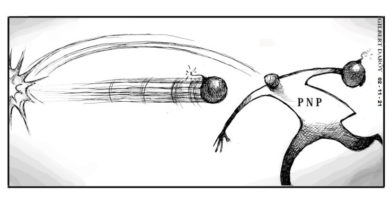HEADLINE- COVID-19 & VARIANTS: MANILA Philippines — Philippines detects 11 local cases of Delta variant
Health Undersecretary Maria Rosario Vergeire said the 11 local cases were part of 16 new cases of Delta variant or B.1.617.2 sequenced in the country. / AFP/Arun Sanka
.
.

WHO warns more dangerous variants could take hold
MANILA, Philippines — The country has 11 local cases of the more infectious Delta variant of COVID-19, the Department of Health (DOH) reported yesterday.
Health Undersecretary Maria Rosario Vergeire said the 11 local cases were part of 16 new cases of Delta variant or B.1.617.2 sequenced in the country.
Vergeire said the remaining five cases are returning overseas Filipinos (ROFs), citing the latest whole genome sequencing report of the Philippine Genome Center (PGC).
“Eleven cases are classified as local cases. Six cases have been detected in Region 10 and are part of a large cluster of cases, with dates of onset between 23 to 28 June. All have been tagged as recovered,” she added.
On the other hand, one of the 16 ROF cases arrived in the Philippines from the United Kingdom last April 26 and has been tagged as recovered after undergoing the 14-day quarantine period.
Two of these cases arrived from Qatar on June 15 and tagged as recovered.
The DOH is still verifying the arrival and quarantine status of the two other ROF cases.
Data showed that of the 11 local cases, two were detected in Manila, one of which was tagged as fatality on June 28.
Five cases were found in Cagayan de Oro, one in Misamis Oriental, two in Antique and one in Pampanga.
The 16 new cases bring to 35 the total number of Delta variant cases sequenced in the Philippines.
In an interview with The Chiefs on Cignal TV’s One News, Vergeire said the country has been preparing for the entry of the Delta variant by expanding the bed capacity of hospitals for COVID-19 cases and by strengthening border controls, testing, contact tracing and quarantine.
Vergeire added the Department of Trade and Industry has also called on manufacturers of oxygen to increase their production.
.
No local transmission
Despite the development, DOH chief epidemiologist Alethea de Guzman said there is still no local transmission of Delta variant in the country.
“For me not yet because we have not been able to link that this one case was able to co-infect another,” she said.
De Guzman added what they see now are “sporadic cases” of Delta variant, but authorities are not doing contact tracing to identify the source of infections and to track down their contacts.
For his part, PGC executive director Cynthia Saloma said the 11 local cases are “100 percent sourced from abroad.”
She dismissed insinuations that there was a mutation of the Delta variant in the country that resulted in the 11 local cases.
“We have done genetic analysis of all the Delta variants in the Philippines and they are all rooted in samples abroad,” she maintained.
Saloma said some cases are “very closely linked with clusters in India, while others are in United Arab Emirates and others are probably in Southeast Asia.”
“So don’t think that the variant had naturally evolved here in our country because for it to be classified as Delta there are many hallmark mutations that must be classified,” she added.
According to DOH-Technical Working Group on New Variants member Anna Ong-Lim, the current protocols of the country against COVID-19 still work against variants but they have to be scaled up further.
“It is very important to strengthen our border control because we know that variants are coming in because of returning travelers,” she said.
Lim also pointed out the need to increase the capacity of health care facilities in anticipation of possible surge of cases due to Delta variants.
“We’ve seen it in countries where Delta variant has been detected. Their health capacity was easily overwhelmed and we don’t want that to happen here,” she added.
.
Strict protocols
Vice President Leni Robredo on Friday called for “maximum” observance of health protocols and urged the Duterte administration to expedite the deployment of COVID-19 vaccines.
“We heard that there were recorded cases of Delta variant in the country, this is something we must prepare for. We’ve seen the experience of other countries such as Indonesia that had so many cases because this variant spreads so fast,” Robredo said in a video message posted on her official Facebook page.
“My reminder for everyone is to follow health protocols, to wear a mask, observe physical distance and avoid crowded places,” she said.
“We need to be prepared because we don’t want another surge. For me, we need to do maximum observance of health protocols now,” she said.
Robredo also urged Filipinos to get vaccinated against COVID-19 even as she appealed to those already inoculated not to let their guard down as they can still contract the virus.
“For those who have been vaccinated, I hope we will not be complacent because while we are spared from severe symptoms, we can still be infected,” she added.
The Vice President urged the government to fast-track the deployment of COVID-19 vaccines to provinces.
“I hope our deployment of the vaccines will be even faster, triple than its speed now,” she said.
Robredo said the Office of the Vice President and the City of Manila will roll out again the Vaccine Express, a drive-thru vaccination service, on Tuesday to inoculate more citizens in the city.
She also called on local governments to provide incentives to their constituents to encourage them to get COVID-19 vaccines.
.
WHO warning
The World Health Organization’s emergency committee warned Thursday that new and more dangerous COVID-19 variants were expected to spread around the world, making it harder to halt the pandemic.
The announcement was further bad news as several countries battle a new wave of infections fanned by new variants, namely Delta which was first identified in India.
“The pandemic is nowhere near finished,” the committee warned in a statement Thursday following a meeting a day earlier.
Committee chairman Didier Houssin acknowledged to reporters that “recent trends are worrying.”
He said a year-and-a half after the WHO first declared a so-called Public Health Emergency of International Concern (PHEIC) – its highest alert level – “we are still running after this virus and the virus is still running after us.”
Aside from Delta, three concerning COVID-19 variants are dominating the global pandemic picture: Alpha, Beta and Gamma.
But the committee warned that worse could lie ahead, pointing to “the strong likelihood for the emergence and global spread of new and possibly more dangerous variants of concern that may be even more challenging to control.”
WHO declares variants as being “of concern” when they are seen as either more transmissible, more deadly or have the potential to get past some vaccine protections.
“The pandemic remains a challenge globally with countries navigating different health, economic and social demands,” the committee said.
“Countries with advanced access to vaccines and well-resourced health systems are under pressure to fully reopen their societies,” it said.
On the other hand, “countries with limited access to vaccines are experiencing new waves of infections, seeing erosion of public trust” as well as “growing economic hardship and, in some instances, increasing social unrest,” it added.
The experts said that as a result many countries were instituting many “increasingly divergent policy decisions that address narrow national needs which inhibit a harmonized approach to the global response.”
They added that “the use of masks, physical distancing, hand hygiene and improved ventilation of indoor spaces remain key to reducing transmission.”
They underscored the need to vaccinate at least 10 percent of the population of each country by September and vaccine sharing between richer countries and poorer ones.
“Many countries have now vaccinated their priority populations, it is recommended that doses should be shared with countries that have limited access before expanding national vaccination programs into lower risk groups.”

.











